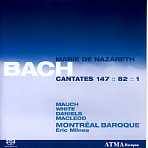I’ve never been a big fan of the “one-voice-to-a-part” cult of Bach performance, but I have to say that this is really outstanding, the renditions–especially of BWV 1–as convincing as any I’ve ever heard. Yes, the full-bodied richness of tone and texture that characterize John Eliot Gardiner’s performance (SDG) of Wie schön leuchtet der Morgenstern with his 20-voice Monteverdi Choir can’t be matched or displaced by four voices, no matter how well-chosen and balanced, but it also would be hard to criticize this reading, which is wonderfully vibrant and soul-satisfying, every bit as buoyant as acclaimed versions by more substantial forces. Besides the excellent soloists, whose stylish, energetic singing is a pure joy to hear, this orchestra is absolutely terrific, with warm, articulate strings and brilliantly resonant trumpet and horns. And speaking of “joy”, the cantata’s opening chorus is the embodiment of the emotion.
This BWV 147 must compete with Joshua Rifkin’s landmark one-to-a-part version from 1985, whose plusses range from performers (not least of which is violinist Nancy Wilson’s defining obbligato in “Bereite dir”) to the exceptional period-instrument orchestra and production team–legendary producer Peter Wadland and engineer Simon Eadon. In all respects that recording is superior to this (even countertenor Drew Minter has an impressive outing), especially regarding vocal/instrumental balances, but Eric Milnes and his Montréal Baroque–highlighted by soprano Monika Mauch and countertenor Matthew White–make a most agreeable if not totally convincing case for their stance on Bach performance practice. Ultimately however, whatever your view regarding appropriate performing forces in Bach, your enjoyment will come from listening–and in this case, even for a one-to-a-part skeptic, Milnes, Montréal Baroque, and Atma deliver nothing but unmitigated pleasure. Enlightening!
































